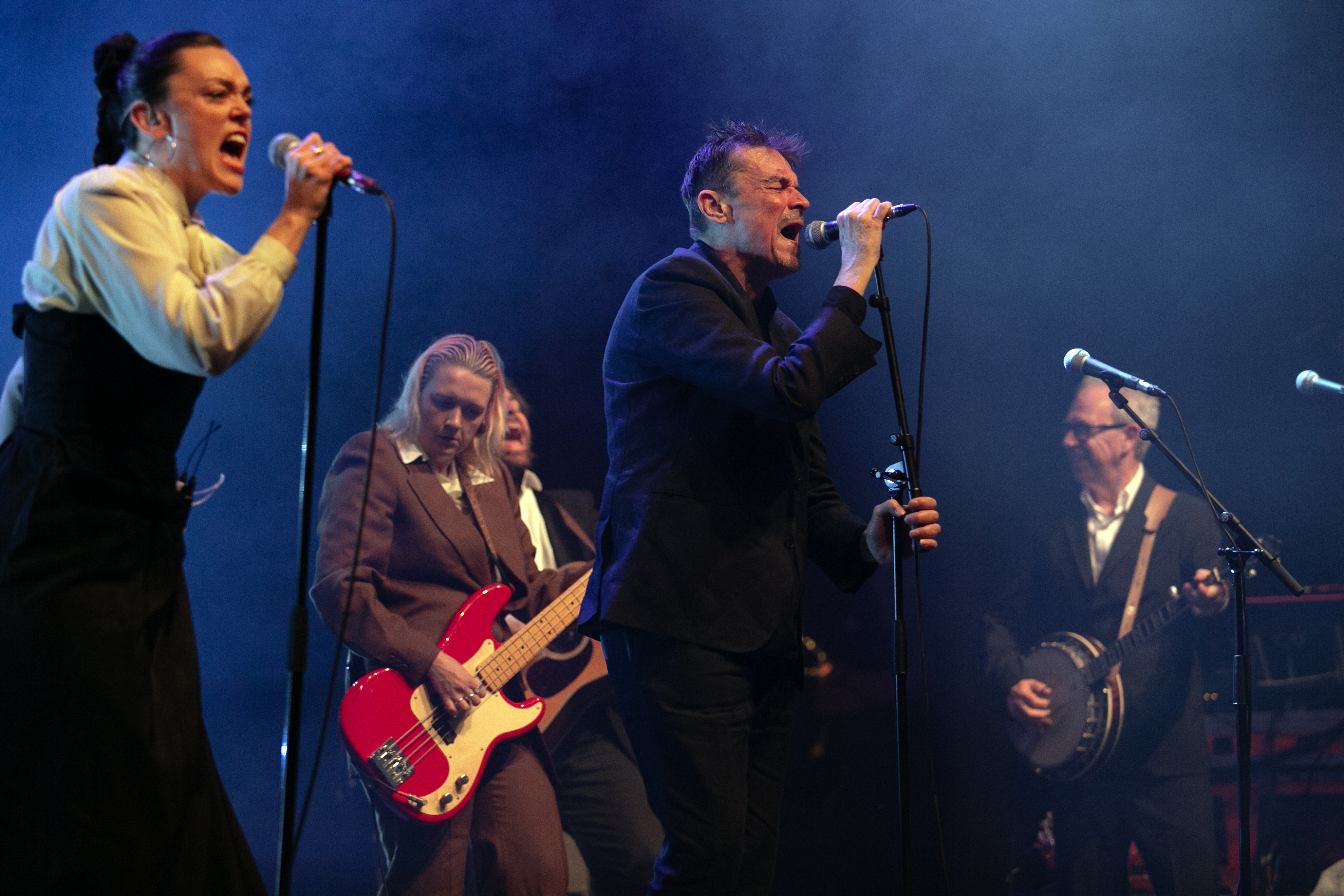The Pogues
O2 Apollo, Manchester
Someone in the moshpit is waving a set of full-size crutches over their head while the Pogues tear through yet another chorus of Sally MacLennane, accompanied by about 3,500 gutsy backing vocalists. This tale of yearning, emigration and self-medicating sounds like an Irish traditional, the kind that plugs into the ancestral Celtic mains: full of the pain of leave-taking, of hearing good news and bad, from far away; of the perils and comforts of a great boozer.
But it was written in the 1980s by Pogues frontman Shane MacGowan, a Kent-born London punk of Irish descent who had briefly attended private school on a scholarship, and played by a majority-British band who’d learned Irish folk traditions while on the job, more or less.
MacGowan died in 2023 (preceded by other band members Darryl Hunt and Philip Chevron). This Pogues tour – marking the 40th anniversary of the group’s breakthrough album, Rum, Sodomy & the Lash – follows last year’s smaller clutch of dates in honour of their first LP, 1984’s Red Roses for Me. An extended wake for fans, those shows doubled as an opportunity to underline the Pogues’ influence on a new generation of eclectic Irish folk musicians.
Once again, the Pogues are bringing the spirit of the ceilidh on the road by getting as many singers and instrumentalists on the touring payroll as humanly possible; a tour that emphasises that they were not one man, but a band. The surviving Pogues – Spider Stacy, on tin whistle, vocals and compere duty, plus Jem Finer on banjo, hurdy-gurdy and saxophone, and James Fearnley, mostly on accordion, with forays into guitar and mandolin – are joined by a generous cast of extras, the size of which makes you wonder how this wonderful tour is making anyone any money, even as it dispenses so much joy and succour.
Two members of Lankum, Irish drone-folk marvels and Pogues cover version enthusiasts, figure heavily: guitarist Daragh Lynch and drummer John Dermody, who marshals this large cast into motion at the start of every track with terse mastery.
Other, more trad players are also on board, such as pipes player Fiachra Meek, and Celtic voices in the excellent Lisa O’Neill and the equally transporting John Francis Flynn, charged with delivering And the Band Played Waltzing Matilda, a cover in which the pointlessness of war is delivered with a mix of stoicism and bewilderment.
It’s quite an ask for any singer to go toe-to-toe with the Pogues’ massed ranks of banjo, guitar, uilleann pipes, accordion, percussion, tin whistles and a three-person horn section at full pelt. But a combination of lung power, technique and a wizard at the mixing desk ensures all the vocal performances are on point.
No one replaces MacGowan, of course – although Stacy, full of bonhomie and effusive running commentary, can be relied upon to deliver many of MacGowan’s lines with verve and spittle. He can reach the garrulous amphetamine velocities of Billy’s Bones – which he sings alongside harpist Iona Zajac – but turns into a big softie when effusing about the touring party arrayed alongside him.
When folk singer O’Neill takes the lead on the love song A Rainy Night in Soho, from the Pogues’ 1986 EP Poguetry in Motion, Stacy declares: “If this doesn’t break you, then you’ve hearts of stone.”
Newsletters
Choose the newsletters you want to receive
View more
For information about how The Observer protects your data, read our Privacy Policy
This great night out is mostly about being broken, repeatedly, by emotional artillery, then being stitched back together again on a makeshift tavern operating table, with spirits as disinfectant and analgesic.
This great night out is mostly about being broken, repeatedly, by emotional artillery, then being stitched back together again
This great night out is mostly about being broken, repeatedly, by emotional artillery, then being stitched back together again
Rum, Sodomy & the Lash took its name from a Winston Churchill quip about Royal Navy traditions. The excellent poster for the band’s forthcoming US tour provides a cheeky literal rendering. It featured songs about men suffering in war, or losing their physical and mental health building the infrastructure of other countries, or being stripped of their innocence on the streets of London. It’s a workingman’s blues, really.
Back then, those male-centred concerns came tempered by the presence of female bassist Cait O’Riordan, in the lineup for the band’s first three records, from the age of 17. Tonight, her bass role is filled by Goat Girl’s Holly Mullineaux, who sometimes howls fiercely into the microphone, ad hoc. On Rum..., O’Riordan sang I’m a Man You Don’t Meet Every Day. It was a purposeful gender swap. The Pogues tilted at tradition, but were powered by punk’s table-turning energy.
This evening, the enthralling Zajac takes that lead vocal. Throughout, four other women also channel the pain of fighting and losing. The traditional The Gentleman Soldier assigns Stacy to sing the female parts while Nicola Kearey from east London folk outfit Stick in the Wheel takes the male soldier’s, who leaves a country girl pregnant out of wedlock.
Most notably, Tyneside-born singer Nadine Shah, whose own output feels miles away from the Celtic tradition, brings furious confrontation and her own broad north-eastern vowels to tracks such as The Old Main Drag. It’s a sad song: a teenager arrives in London and is forced to sell their body to make ends meet. They numb the pain with pills and booze, get beaten up by police, lose the good looks that makes them their money. They eye their older counterparts, leaking bodily fluids, with compassion and horror. MacGowan’s wistful original swathed the song’s narrative in weary matter-of-factness, while the unsparing choral version played by Lankum in years gone by dialled up the song’s desolation.
By contrast, Shah’s take is full of avenging outrage, not just for Irish émigrés, but for women wronged everywhere. “I’ve been spat on, and shat on, and raped and abused!” she howls accusingly at the front rows, who would jump back if they could.
The Pogues dragged Irish traditional music kicking and screaming into a new century once. It seems they are doing it again.
Photograph by Richard Saker/The Observer

